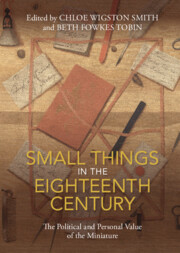Book contents
- Small Things in the Eighteenth Century
- Small Things in the Eighteenth Century
- Copyright page
- Contents
- Figures
- Notes on Contributors
- Acknowledgments
- Introduction
- Part I Reading Small Things
- 1 “The Sum of All in All”
- 2 Nuts, Flies, Thimbles, and Thumbs
- 3 Gothic Syntax
- 4 Small, Familiar Things on Trial and on Stage
- Part II Small Things in Time and Space
- Part III Small Things at Hand
- Part IV Small Things on the Move
- Afterword
- Select Bibliography
- Index
4 - Small, Familiar Things on Trial and on Stage
from Part I - Reading Small Things
Published online by Cambridge University Press: 29 September 2022
- Small Things in the Eighteenth Century
- Small Things in the Eighteenth Century
- Copyright page
- Contents
- Figures
- Notes on Contributors
- Acknowledgments
- Introduction
- Part I Reading Small Things
- 1 “The Sum of All in All”
- 2 Nuts, Flies, Thimbles, and Thumbs
- 3 Gothic Syntax
- 4 Small, Familiar Things on Trial and on Stage
- Part II Small Things in Time and Space
- Part III Small Things at Hand
- Part IV Small Things on the Move
- Afterword
- Select Bibliography
- Index
Summary
This chapter studies small things that were neither expensive nor finely crafted, but were cherished by their owners, drawing on trials for theft at the Old Bailey and John Gay’s The Beggar’s Opera (1728). Small items such as buttons, thimbles, needles, and handkerchiefs were easily pilfered by thieves, and appear frequently as stolen goods that women and men sought to recover through the courts. In both the courthouse and the playhouse, thieves and victims agreed that small things could be recognized by their original owners. Trial testimony shows how owners recalled “remarkable” details about their possessions, describing tiny marks known only to them and discerned via repeated handling and viewing over time. In this way, these remarkable details, through their emphasis on sight, offer alternative ways to comprehend the affordance of things in the eighteenth century. Such personal marks prove troublesome to the thieves of Gay’s ballad opera, whose operations depend on small things being made unfamiliar in order to circulate in the secondhand marketplace. Nothing was too small or too commonplace to be reclaimed by someone. Remarkable details held out the promise that small things could be returned and that no thing was too commonplace to be missed by someone.
Keywords
- Type
- Chapter
- Information
- Small Things in the Eighteenth CenturyThe Political and Personal Value of the Miniature, pp. 64 - 76Publisher: Cambridge University PressPrint publication year: 2022

